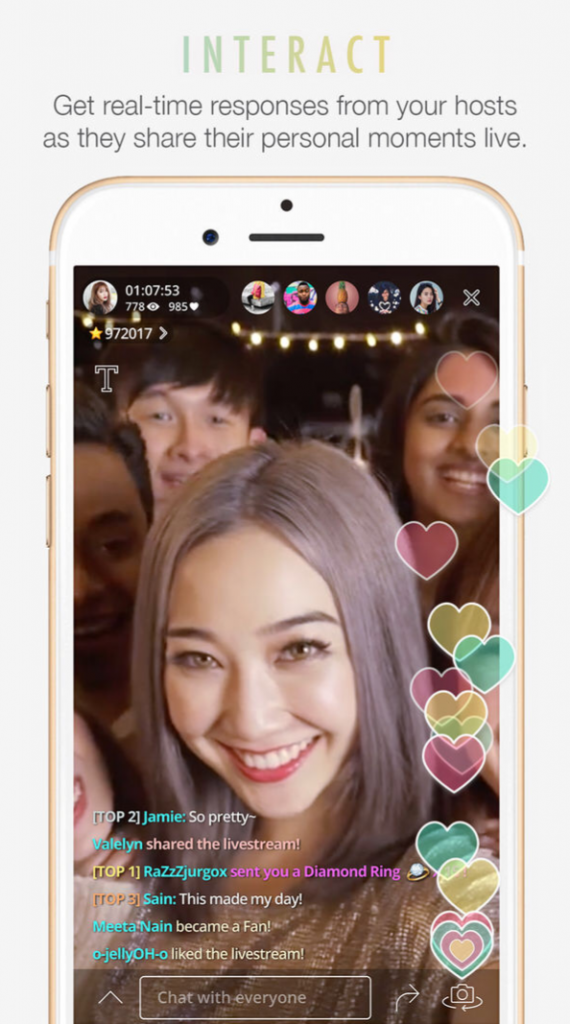From cam girls to pornography studios that will create films to your exact kink and specification, the internet has long thrived as a space to explore our sexuality in private. But more than that, it has also made it possible for content to be tailored to our individual tastes.
For a while now, live-streaming apps have facilitated a similar model. On apps like Bigo Live, one of the first things you’re presented with on opening the app is an entire array of girls, many of whom sport heavily made up faces.
Female streamers outnumber male ones by a long shot, and it doesn’t take much of an imagination to realise how much this is like being in a Thai disco where women are paraded in front of customers on a stage. It’s mass objectification made efficient, and to a live audience.
These days, streamers have taken to creating their own content in order to attract viewers and keep them entertained. This can range from playing songs live to discussing K pop culture or even just broadcasting an endless live feed of themselves doing nothing.
In exchange, viewers shower streamers with gifts that they buy with real money. Apps like Bigo Live and BeLive take a cut, and streamers get to cash out with the remainder. On other apps like 17, streamers are paid US$1 if there are 1000 viewers watching their broadcast.

From a viewer’s perspective, I saw the obvious appeal in being singled out by the streamer amidst an incessant wave of comments from strangers. Because comments on top streams can come in faster than is humanly possible to read them, you are literally fighting for attention.
And so buying gifts becomes the only way to stand out from the herd. The bigger (pricier) the gift, the more elaborate the accompanying animation on the streamer’s screen.
If you’ve been to a Thai disco, this dynamic will feel familiar. You buy a girl a flower, and you get attention in return. Often, you’ll have to compete with other men in a bidding war of sorts to see who can hang the most expensive flower. And make no mistake, it is all about ego and displaying one’s “masculinity”.
From the Bigo streamer’s perspective, I watched as she told a viewer, “I’m not going to answer your question until you buy me a Porsche.”
Right on cue, a Porsche materialised in the middle of her screen in a shower of yellow sparks.
Just like that, the viewer had won her attention on the app by outbidding everyone else. This, she told me, was how streamers kept viewers coming back. It also wasn’t uncommon, as many would know by now, for streamers to film themselves doing things while wearing very little.
“It’s all just a tease,” she said, “So as expected, it helps to be good looking.”
In the same way, popular girls in Thai discos tend to receive more flowers than others. If someone comes along with a $1000 garland for a particular girl, everyone knows that he’s eliminated the competition.
The only difference here is that with Thai discos, you actually get to meet the girl afterwards and take her out. With live-streaming apps, you can be strung along for eternity.
The only winners are the app itself and the girl.

Several interesting things happened recently that put these numbers into perspective.
On 18th October, Bloomberg reported that Singapore’s Temasek Holdings had led a $502m investment round into augmented reality (AR) company Magic Leap.
While many have wondered what Temasek’s interest in AR could possibly be, I remembered that back in April this year, local dating app Paktor announced its merger with with 17.
Interestingly, Vertex Venture Holdings Ltd—a subsidiary owned by Temasek—first led a US$5m Series A investment round into Paktor in 2014.
Perhaps these events have nothing to do with each other. But it did make me wonder: is Temasek’s long term vision perhaps to bring AR to live-streaming? And even if Temasek doesn’t do it, isn’t it just a matter of time before this happens?
Much like how Pokemon Go allows Pokemon to be projected into our physical environment, AR will allow streamers and/or their avatars to be projected right onto the viewer’s environment.
In other words, you could look into your phone, and see your favourite streamer FireGAL93 sitting right on your couch.
Today, viewers are already competing with each other by sending ever pricier virtual gifts to their streaming idos. In return, they get everything from shout-outs to handmade art work sent directly to their home.
And so while live streamers may never want to meet their viewers for fear of their own safety, allowing their likeness to be projected elsewhere for a premium fee might actually sound appealing.
If this doesn’t bring the Thai disco into your bedroom, I don’t know what will.
In a story published last month by The Atlantic, it is extensively detailed how smartphones have shaped much of the behaviour of today’s teenagers. They’re partying, drinking, and hooking up less, but this is because they spend more time tethered to social media and their smartphones than going out.
As a result, they’re less socially adept and less equipped to deal with the nuances of real life interaction.
While some see this as the beginnings of a social problem or a mental health pandemic, it’s also a massive opportunity for technology companies. And it’s a problem that’s only going to escalate as these companies move to keep us glued to our phones for as long as possible.
As it is, Apple has been aggressively marketing the AR feature of the upcoming iPhone X, and Magic Leap has raised a total of US$1.4b in funding despite having yet to release an actual product.
If AR does make its way into live-streaming, and ends up shaping behaviour that prefers this combination over real life interaction, then the Thai disco comparison becomes particularly harrowing.
In a Thai disco, you understand that exchanging money for company is a practice that really only applies there. It’s a transaction that is free from expectations or surprises.
You are also usually there for what you cannot get elsewhere.
But what happens when such practices start going mainstream? When they start to permeate our everyday interactions through technology, and it starts feeling normal that I don’t get to talk to someone unless I can buy that opportunity in some way?
To me at least, this is where the Thai disco really begins to become a part of everyday life.
On dating apps like Paktor, users can buy gifts for each other with cash. When a gift is accepted, a match will then be created allowing users to start a conversation.
Elizabeth Boon, a freelance emcee who reviewed Paktor in 2016 tells me that gifts received can’t be exchanged for anything—a fact confirmed by a regional marketing VP at Paktor who told me, “The gifts are seen as a form of ‘bragging rights’ highlighting a profile is popular based on the number of gifts received.”
As dating apps begin looking for more ways to monetise beyond subscriptions, we can expect to see more instances of this. And all this really does is reinforce the idea that no money, no talk.
With live-streaming set to grow even more over the next few years, those who grew up on the internet and for whom the internet is real life might soon realise that they don’t deserve love or attention unless they can pay for it.






